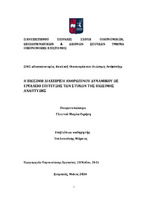Η βιώσιμη διαχείριση ανθρώπινου δυναμικού ως εργαλείο επίτευξης των στόχων της βιώσιμης ανάπτυξης

Προβολή/
Λέξεις κλειδιά
Ανθρώπινο δυναμικό ; Βιώσιμη διαχείριση ανθρώπινου δυναμικού ; Οργανωσιακή - εταιρική κουλτούρα ; Στόχοι Βιώσιμης Ανάπτυξης ; Εταιρική κοινωνική ευθύνη ; Human resources management ; Sustainable human resource management ; Green management ; Organizational - corporate culture ; Sustainable Development Goals ; Corporate social responsibilityΠερίληψη
Η παρούσα διπλωματική εργασία εξετάζει τη Βιώσιμη Διαχείριση Ανθρώπινου Δυναμικού ως εργαλείο για την επίτευξη των στόχων βιώσιμης ανάπτυξης της Agenda 2030. Η έρευνα επικεντρώνεται στη θεωρητική θεμελίωση και τις πρακτικές εφαρμογές της βιώσιμης διαχείρισης του ανθρώπινου δυναμικού, με έμφαση στην εταιρική κοινωνική ευθύνη (CSR) και την πράσινη διαχείριση ανθρώπινου δυναμικού (Green HRM). Αναλύει πώς οι αρχές της βιωσιμότητας μπορούν να ενσωματωθούν στις λειτουργίες του ανθρώπινου δυναμικού, όπως η πρόσληψη, η επιλογή, η αξιολόγηση αποδόσεων, και η εκπαίδευση των εργαζομένων, προσανατολίζοντας αυτές τις λειτουργίες προς την επίτευξη των Δεκαεπτά Στόχων της Βιώσιμης Ανάπτυξης της Agenda 2030. Ειδικότερα, επισημαίνεται ο ρόλος της βιώσιμης διαχείρισης του ανθρώπινου δυναμικού στην ενίσχυση της επίτευξης συγκεκριμένων στόχων της βιώσιμης ανάπτυξης, όπως οι στόχοι 3 (Καλή Υγεία και Ευημερία), 4 (Ποιοτική Εκπαίδευση), 5 (Ισότητα των Φύλων), 8 (Αξιοπρεπής Εργασία και Οικονομική Ανάπτυξη), 9 (Βιομηχανία, Καινοτομία και Υποδομές), 10 (Μείωση των Ανισοτήτων), 12 (Υπεύθυνη Κατανάλωση και Παραγωγή), 13 (Δράση για το Κλίμα), και 17 (Συνεργασία για τους Στόχους). Παρουσιάζονται βέλτιστες πρακτικές που μπορούν να υιοθετηθούν από τη διοίκηση ανθρώπινου δυναμικού για την προώθηση μιας περιβαλλοντικά και κοινωνικά ηθικής κουλτούρας εντός και εκτός των επιχειρήσεων. Τέλος, μας απασχολεί η σημασία υιοθέτησης βιώσιμης συμπεριφοράς από τους εργαζομένους και πως η τελευταία αυτή μπορεί να έχει θετικό αντίκτυπο όχι μόνο στις επιχειρήσεις αλλά και ευρύτερα την κοινωνία.


